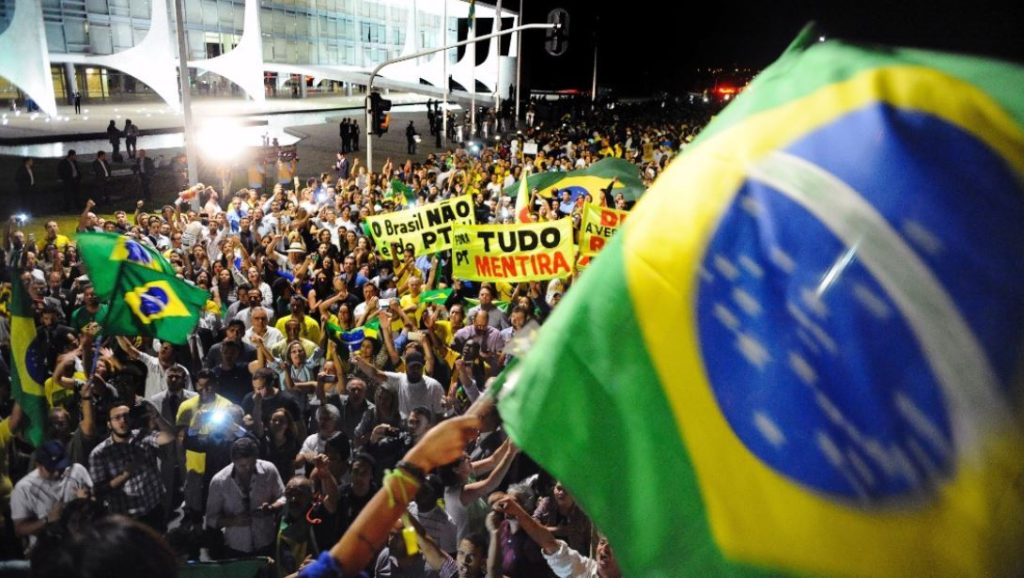by Leonardo Boff
Eco-Theologian-Philosopher, Earthcharter Commission
The over-all Brazilian crisis, that affects every sector, can be understood in different ways. The sociological, political and historic interpretations have prevailed up to now. I will try to present an interpretation derived from the C. G. Jung categories of his illuminating analytical psychology.
I have already advanced the hypothesis that the present situation is not a tragedy, no matter how perverse the consequences of establishing a ceiling on expenditures (PEC 55), that is more than a freeze are for the majority of the poor and the future of the country; it signifies the impossibility of creating a Social State and, with that, disposes of the common good, that includes everyone.
A tragedy, as the Greek tragedies show, always ends bad. I do not believe this is the case of Brazil. I believe we are in the middle of an unprecedented crisis of the foundations of our society. The crisis refines, purifies, and allows a qualitative leap towards a higher level of our historic evolution. We will be better and with a more integrated identity when we emerge this crisis.
Everyone, including those who revel in their history, among others, recognize two dimensions: the dimension of darkness, and that of light. Others speak of the demens (demented) and the sapiens (wise) or of positive and negative forces, of the order of the day and the order of the night, or of the thanatos (death) and the eros (life), or of the repressed and the enlightened. These dimensions always come together and coexists in each other.
The current crisis has revealed the darkness, and all that our society has repressed for centuries. As Jung would observe «to recognize the darkness is indispensable for any type of self realization and, because of that, it is generally met with powerful resistance» (Aion &14). The darkness is an archetype (guiding image of the collective unconscious) of our scars and wounds and of the repugnant facts we try to hide because they fill us with shame and guilt. It is «the dark side of the vital force» that touches persons and entire nations, the psychologist from Zurich observes (&19).
Thus, the scars and wounds that constitute our repressed and shameful acts, such as the genocide of the indigenous peoples throughout our history and to the present; the colonization that made Brazil less than a nation, but a great international enterprise of exportation that, to tell the truth, also continues to the present. We could never create our own autonomous project because we always accepted being dependent or because we were restrained. When such a project began to be formulated, as in the recent progressive governments, it was soon attacked, slandered and forestalled by yet another coup by the moneyed classes, descendants of La Casa Grande, a coup always hidden and disguised such as the coups of 1964 and 2016.
Slavery is our main shame, because for centuries we bought and sold millions of human beings brought forcefully from Africa, and treated as “things.” Once liberated, those human beings received no compensation, land or tools for work, or housing; they live in the favelas of our cities. Blacks and mestizos constitute the majority of our people. As Jesse Souza very well showed, the contempt and hatred directed against the slaves has been transferred to their descendants of today.
According to Darcy Ribeiro and Jose Honorio Rodrigues, the people in general, have given us the best of our culture, language and arts, but as Capistrano de Abreu well underlined it, the people were «castrated and castrated again, bled and bled again», considered useless and ignorant and therefore marginalized to the point that they would never get out.
In A Portrait of Brazil: an essay on Brazilian sadness, (Retrato de Brasil: ensayo sobre la tristeza brasilera,1928), in an exaggerated form but partly true, Paulo Prado writes about this dark aspect of our history, and concludes: «We live sad in a radiant land», Interpreters of Brazil, (Interpretes de Brasil, vol.2 p.85). This reminds me of Celso Furtado’s question that he carried to his grave without an answer: «Why are there so many poor people in such a very rich country?» We now know why: because we were always dominated by elites that never had a plan for a Brazil for everyone, only a Brazil for themselves and their wealth. How can it be possible that 6 multi-millionaires have more wealth than 100 million Brazileans?
The current crisis has caused our darkness to explode. We discovered that we are racists, prejudiced, that we are living a social injustice that cries to God, and that we have not yet been able to re-establish a different Brazil on other bases, principles and values. Hence the irruption of rage and violence. It does not come from the majority of the Brazilian poor. It is spread by the dominant elites, supported by the means of mass communication that form the Brazilian imagination with their soap operas and disinformation. To Jung «the totality that we want is not perfection, but a complete human being» (Ab-reação, análise dos sonhos e transferência & 452) that does not repress the darkness, but integrates it into a dimension that is greater than light. That is what we wish for, as a way out of the present crisis: do not repress the darkness, but include it, consciously, in our everyday life, overcoming antagonisms and exclusions, to live together in the same Brazil that Darcy Ribeiro used to say was «the most beautiful and smiling province of the Earth».

